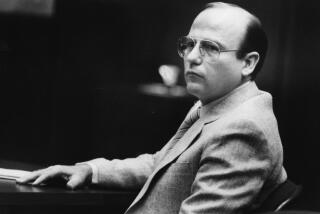Convicted Killer Asserts Innocence
- Share via
SANTA ANA — A convicted murderer told the jury considering the death penalty against him Tuesday that he was guilty of robbery and of having a gambling addiction, but not of murder.
Bill Charles Poynor, 52, insisted he didn’t kill Robert T. Walsh, a former police officer who disappeared en route to service an automated teller machine in April 1995. Firefighters found Walsh’s charred body inside a burning car two days later. About $13,000, which he had collected, was missing, investigators said. Witnesses placed Poynor at the scene.
Delivering his story before a Superior Court jury of nine men and three women, Poynor said he was stunned when they convicted him of first-degree murder.
Because the killing was committed during a robbery, Poynor could be sentenced to death.
“I didn’t do it,” he said. “I didn’t get justice. The family didn’t get justice. . . . The people of Orange County didn’t get justice. Somewhere out there is the killer. I’m sure he’s laughing it off.”
Poynor did admit to a string of holdups dating to the 1970s but said he never seriously injured anyone during those crimes.
In cross-examination, Deputy Dist. Atty. Lew Rosenblum questioned why Poynor brought a loaded gun on many of his robberies. Rosenblum also said that in several cases, Poynor had put others in danger to protect himself. One incident involved a robbery in the 1980s in which Poynor took a hostage so police wouldn’t fire at him, Rosenblum said.
The prosecutor also presented evidence that Poynor had lied on several occasions to protect himself, including one case in which he lied to his wife about his name and criminal past.
“When it is in your interest to lie, you are willing to do that,” Rosenblum told Poynor.
Rosenblum also challenged Poynor’s contention that it was his father who drove him to crime, saying that it was Poynor who decided to rob, not his father.
“You made the decision that you wanted the money for gambling, so you would just take it, didn’t you?” Rosenblum asked. Poynor answered yes.
Poynor, who was dressed in a powder-blue shirt and khaki pants, generally showed no emotion as he recounted his life.
His father, whom he described as “a drinker and a gambler,” taught him to play pool and cards for money at the age of 12. Addicted to gambling as an adult, he committed nearly 50 holdups, including one at his own bank in Garden Grove, records show.
Although Poynor said he robbed “for gambling purposes,” he also admitted to having spent the stolen money on nice hotels, dates and luxuries. But Poynor tried to reform, he said, taking jobs that included a short stint as a security officer.
“They asked me to apply for a gun permit,” Poynor said. “I knew I couldn’t get a gun permit. . . . I quit.”
A few months later, Poynor said, he turned to robbery again.
Asked what he had felt as his robbery victims testified about the trauma, Poynor said, “I was upset, kind of cringing. . . . I would apologize personally to them” if given the chance. “In my own mind, I knew they were never in danger, but they didn’t know that.”
More to Read
Sign up for Essential California
The most important California stories and recommendations in your inbox every morning.
You may occasionally receive promotional content from the Los Angeles Times.










